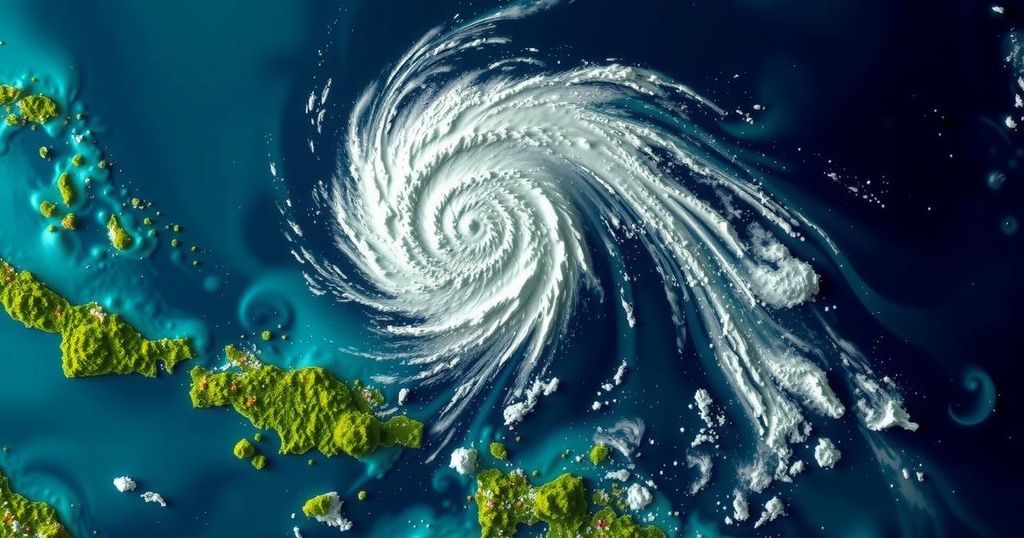Declining Chances for Tropical Storm Nadine: System AL94 Under Monitoring
Chances for a low-pressure system in the Atlantic, designated as AL94, developing into Tropical Storm Nadine have decreased from 60 percent to 20 percent. Currently east of the Leeward Islands, the system is expected to bring heavy rain and gusty winds to the northern Caribbean. Despite ongoing monitoring, adverse wind conditions may prevent further development.
The prospects of a low-pressure system in the Atlantic Ocean evolving into Tropical Storm Nadine have diminished significantly. Known as AL94, this system has been under surveillance by the National Hurricane Center (NHC) for several days. Originating off the west coast of Africa, AL94 is currently situated to the east of the Leeward Islands and has seen a fluctuation in its potential for development. Initially, the chances of it transforming into a tropical storm were assessed at 60 percent earlier this week, but have since decreased to 20 percent for the next 48 hours and 30 percent over the next week, according to the latest update from the NHC. Despite the possibility for gradual development, the NHC warns that powerful winds may hinder the system’s growth in the coming days. In their update, the NHC noted that “Showers and thunderstorms associated with a trough of low pressure located a few hundred miles east of the Leeward Islands remain disorganized.” The system is anticipated to move quickly westward at approximately 20 mph, passing by the Virgin Islands and Puerto Rico on Friday, and later affecting Hispaniola and the southeastern Bahamas on Saturday. Strong upper-level winds are projected to undermine the system’s potential for development by late weekend. Regardless of its formation status, the system is expected to produce substantial rainfall and gusty winds across northern Caribbean islands, as highlighted by AccuWeather senior meteorologist Tom Kines. Kines stated, “The chances of this developing into a tropical storm or even a hurricane seem to have diminished over the past couple of days. Having said that, there’s still a window that this could develop. If it’s going to do it, it’s got to do it in the next two, maybe three days.” There is no anticipated impact from AL94 on the mainland United States, a relief for Florida, which has already grappled with significant hurricane activity in recent weeks, including storms Helene and Milton. Presently, there are no identified active named storms in the Atlantic, though meteorologists caution that the 2024 Atlantic hurricane season, which concludes on November 30, remains active with conditions still conducive for storm formation. Additionally, meteorologists at the NHC are monitoring another system in the western Caribbean, which may develop gradually; however, like AL94, its potential for strengthening into Tropical Storm Nadine is considered low.
The article discusses the dwindling chances of the low-pressure system known as AL94 in the Atlantic Ocean developing into Tropical Storm Nadine. This situation is currently being monitored by the National Hurricane Center (NHC), which has reported significant fluctuations in the system’s potential over recent days. The article provides updates on the current position of AL94, estimates regarding the likelihood of its transformation, and implications for affected regions in the Caribbean. Furthermore, it touches on the overall state of the Atlantic hurricane season and the attention being given to other potential systems.
In summary, the likelihood that the low-pressure system AL94 will develop into Tropical Storm Nadine has significantly decreased over recent days, with current chances resting at just 20 percent for the next two days. Despite the potential for some slow development, strong upper-level winds are expected to thwart further evolution into a tropical storm. Heavy rainfall and gusty winds are still forecast for northern Caribbean islands. The NHC is continuing to monitor the situation, while the overall Atlantic hurricane season remains active, with meteorologists observing other systems, though their potential for further strengthening appears minimal.
Original Source: www.newsweek.com




Post Comment